
A police car was significantly damaged when the officer tried to block a stolen Mercedes Benz in October 2021. Photo: AFPA Facebook.
The federal police union has called on the ACT Government to review criminal sentencing in the Territory following the sentencing of a drug driver in the Supreme Court.
On 11 July, a teenage man was sentenced to an intensive corrections order (ICO) of about two years and two months after pleading guilty to multiple driving offences, including driving at or near police and aggravated driving.
Australian Federal Police Association (AFPA) president Alex Caruana said the government needed to prove current sentencing practices were in line with community expectations and that people convicted of criminal behaviour received “appropriate sentencing”.
“Regularly, we have contact with our ACT Policing members, and one of their biggest concerns relates to bail and sentencing in the ACT,” he said.
“A perfect example relates to the teenager in the stolen Mercedes that nearly ran over three police officers and crashed into a police car. The teenager caused over $100,000 in damage and, by his admission, could have taken the lives of those officers doing their job. His sentence, if you can call it that, was an intensive corrections order.
“At what stage does the risk to the community become important? Throughout all the commentary about recidivism offending, it always comes back to the police to address the matter. At what stage will responsibility be put on the judiciary?”
Mr Caruana also slammed the government’s ongoing plans to decriminalise heroin, ice and cocaine. He argued more investment was needed for the health and rehabilitation sectors instead.
“If the judiciary doesn’t have avenues to divert people into, or those diversion pathways are closed or blocked, what are they meant to do come sentencing?” he asked.
“An intensive corrections order for an offender that could have seriously injured or killed three police officers and caused over $100,000 in property damage doesn’t pass the pub test, nor does it align with community expectations.
“An intensive corrections order isn’t stopping someone from offending and is a soft approach to serious and often recidivist offending.”
Mr Caruana accused the government of “wanting to appear tough on drugs” rather than properly funding the health and rehabilitation sector alongside decriminalisation.
“When a Justice of the ACT Supreme Court sees the drug and alcohol sentencing list has been full since February with no money to do assessments, then something has gone very wrong,” he said.
“When it comes to sentencing, ACT Justices and Magistrates of the ACT judicial system are hamstrung by poor funding and a lack of resources in the rehabilitation-focused Drug and Alcohol Court,” he said.
Founder of the ACT Now for Safer Roads campaign Tom McLuckie, whose son Matt was killed by a speeding car travelling on the wrong side of the road on 19 May, was also critical of the sentencing.
“This is yet another example that our lenient rehabilitation-focused justice system is not addressing recidivism,” he said.
“I fear … our current sentencing is contributing to increasing crime rates, additional pressure on our policing and justice system, and simply not addressing the likelihood of re-offending.”
In response, Attorney-General Shane Rattenbury said the government was committed to “evidence-based justice policy” that reduced and prevented crime.
“The ACT Government does not believe there is sufficient evidence that a wholesale review of sentencing is required,” he said.
Mr Rattenbury also argued ICOs were an effective and targeted way of reducing reoffending, as they could include conditions of regular drug testing, home visits, community service work, curfews, attendance at rehab programs or reparation. Offenders also had to apply for permission to leave the Territory.
“It is inaccurate to say they are a soft sentence, as they can be very demanding of the individual,” he said.
“Where appropriate, ICOs allow for an offender to serve their sentence in the community, without experiencing time in jail where they are frequently exposed to others who may encourage further criminal behaviour.
“It can also mean they are not removed from their communities or families who are often the most influential people in supporting them to change their ways.”
Mr Rattenbury pointed to the establishment of the Drug and Alcohol Court as a clear indication that the government was also committed to investing in health and rehabilitation services.
“The goal of the court is to offer an effective and evidence-based therapeutic approach to reduce harm for individuals and more effectively protect our community,” he said.
“This relatively new court is currently undergoing its first evaluation period to inform decisions about its future, such as size and funding. Preliminary data from the Drug and Alcohol Court indicate that it is highly effective in reducing re-offending and helping offenders get their lives on track.
“The fact that we are fully utilising the Court program’s capacity shows how successful it has been in its first two years.”
He said the government “strongly agreed” with the need to provide appropriate support and referral services.
The offending in question occurred on 18 and 19 October 2021. The teenager’s crimes included driving a stolen Mercedes Benz while high on drugs at a police officer and smashing into a police car blocking his path.
Justice Michael Elkaim said while police knew the risk involved with their jobs, they were “entitled” to assume their health and lives would not be “unreasonably placed in jeopardy”.
“A young man, high on drugs, driving stupidly and dangerously, is an unfortunate example of the type of event that police have to deal with all too regularly,” he said.
Justice Elkaim also noted the offender had a “long and appalling record” of driving offences, along with drug and assault convictions.
A pre-sentencing report assessed the teenager as having a “medium-risk of general re-offending” and as suitable for an ICO. Justice Elkaim said the best thing for the offender was to enter the drug and alcohol program, but that option was not available as the program was full.
He warned the teenager, who has been imprisoned before, that he had a choice.
“Either he gets used to being in an adult prison because that is where he will be for a good deal of his life if he continues to behave the way he has so far, [or he] can take advantage of the ICO that I intend to impose and begin a new chapter in his life … alternatively he should simply change his usual address to the AMC [Alexander Maconochie Centre],” Justice Elkaim said.
He noted stricter controls available to corrections officers under the ICO rather than a suspended sentence.
“[A] breach of an ICO will almost certainly be treated as a path straight back into prison,” he said.



















